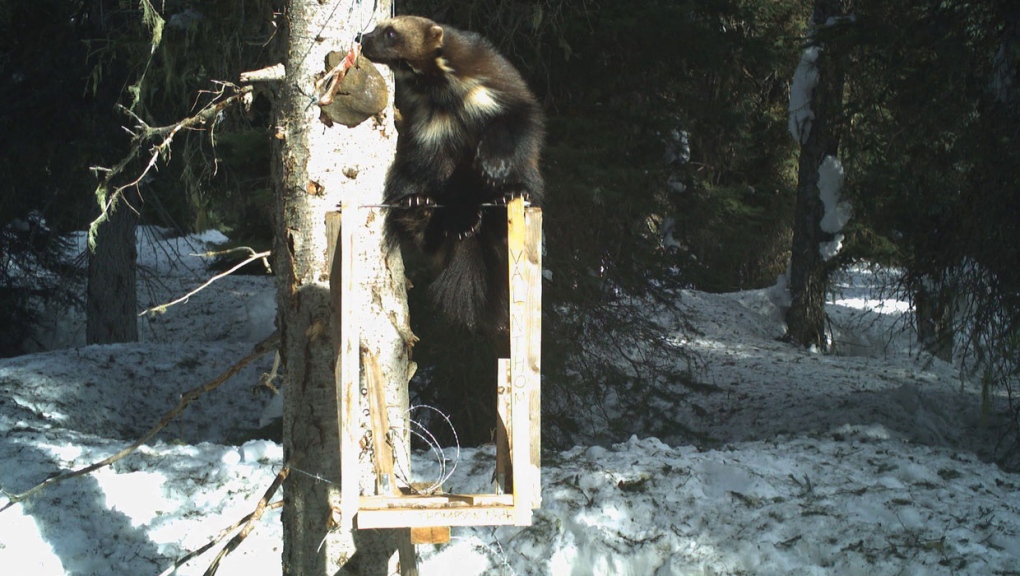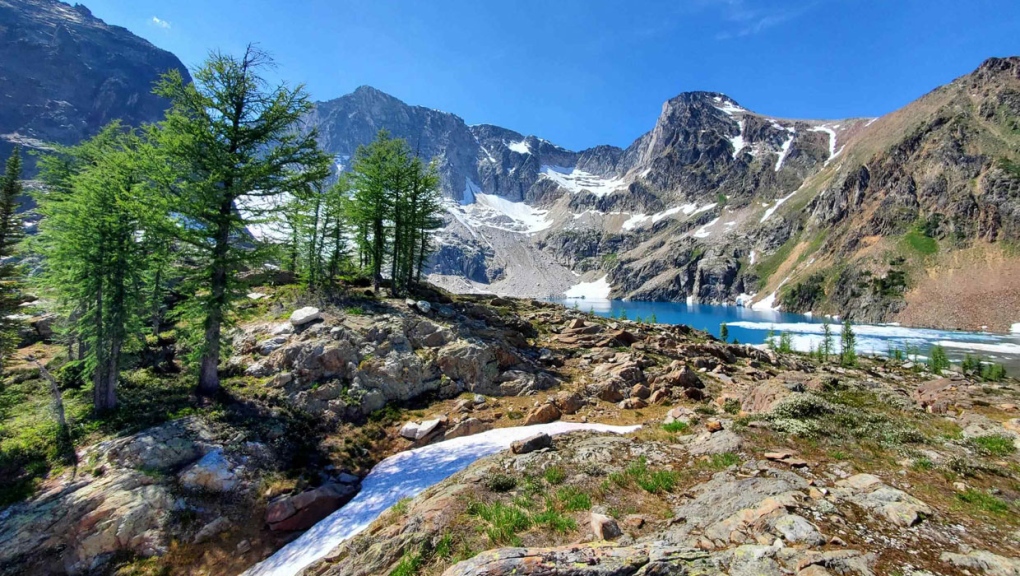Wolverine populations declining in the Canada's Rockies, study suggests
 An undated photo of a wolverine at one of the hair snag stations for a multi-year wolverine research project in Western Canada. The station uses bait to attract wolverines and is designed to take a hair sample and photo via remote camera of the wolverine’s underside to determine its sex and identity via the unique fur pattern. (Mirjam Barrueto, wolverinewatch.org)
An undated photo of a wolverine at one of the hair snag stations for a multi-year wolverine research project in Western Canada. The station uses bait to attract wolverines and is designed to take a hair sample and photo via remote camera of the wolverine’s underside to determine its sex and identity via the unique fur pattern. (Mirjam Barrueto, wolverinewatch.org)
A wildlife group says a recent study suggests that the number of wolverines in Canada's mountain parks is dropping and says climate change, trapping outside park boundaries and increased human activity could be to blame.
The Yellowstone to Yukon Conservation Initiative (Y2Y) says a University of Calgary study, published this week, indicates that even within "the relative safety of parks," the animals are starting to disappear.
The report says the population has dropped by approximately 39 per cent since 2011 – an average annual decrease of about 7.5 per cent.
"Our findings are sobering and do not paint a pretty picture for the future of wolverines," said Mirjam Barrueto, a PhD candidate at the U of C and lead researcher on the study.
Barrueto's work was assisted by Parks Canada researchers, using photos and DNA samples of animals to delve into their lives.
Officials say wolverines are often difficult to study, because of their large home ranges and sparse distribution.
 An undated photo of wolverine habitat in British Columbia’s Purcell mountains. This region was one of the sites for a multi-year wolverine research project in Western Canada. (Mirjam Barrueto, wolverinewatch.org)
An undated photo of wolverine habitat in British Columbia’s Purcell mountains. This region was one of the sites for a multi-year wolverine research project in Western Canada. (Mirjam Barrueto, wolverinewatch.org)
Y2Y says parks and protected areas aren't enough to help wolverines thrive and more needs to be done.
"Improving, not just maintaining, connectivity in and out of park borders will be the key to help wolverines in the coming decades," said Jodi Hilty, president and chief scientist with Y2Y.
Wolverines are also very sensitive to human activity and prefer deep snow to raise their young. That means climate change can be particularly disastrous for them.
"This is a worrying trend. Effective conservation needs to look at multiple effects and across broad scales and borders given the rapidly changing landscape and human activities," Hilty says.
Barrueto says she is confident that her work will influence change for the species.
"I am optimistic this work will be used to make strong science-based management decisions for these tough carnivores."
CTVNews.ca Top Stories

FORECAST Weather warnings issued for nearly all of Canada's provinces and territories
Nearly every province and territory in Canada is subject to weather advisories heading into the weekend.
NEW When do I receive federal benefits this year? Payment dates for 2025
From the Canada Child Benefit to Old Age Security, federal payment dates have been determined for 2025. Find out when you can expect your payments.
opinion Trump in 2025: A fluid and fragile global landscape awaits the president-elect
The road ahead for U.S. President-elect Donald Trump is fraught with peril, and the landmines that await could severely undermine his ambitions amid the slightest miscalculation, writes Washington political analyst Eric Ham in his column for CTVNews.ca.
Suspect charged in northern Ont. road rage incident that went viral
A 37-year-old suspect has been charged in connection with a road rage incident last week in Temiskaming Shores.
A missing surfer in Australia is believed dead in a shark attack, police say
A surfer missing in Australia is believed to have died in a shark attack, authorities said Friday, as they searched the waters where the man disappeared.
Pickering pausing in-person meeting due to alt-right threats, mayor says
Pickering Mayor Kevin Ashe says the city is pausing all in-person meetings, moving them to a virtual format, for the time being due to “alt-right” threats.
2025 is a perfect square year: What makes that so interesting to mathematicians?
Mathematicians aren’t just ringing in 2025, they’re also celebrating the start of a perfect square year.
Industry minister talks TikTok, Elon Musk and the future of his AI bill
As the federal government battles TikTok in court over Ottawa’s order to close its Canadian offices, Canada's industry minister says families should make their own decisions about whether to continue using the app.
Athabasca 'chop shop' bust yields millions in stolen vehicles, heavy equipment: RCMP
RCMP have made what they call a "major recovery" of stolen property in Athabasca.

































